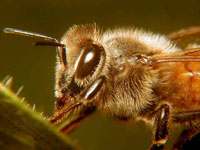Honeybees mysteriously disappear across USA causing national tragedy
A nation-wide honeybee crisis is under way in the United States. Lately bees have begun to rapidly disappear in 24 states across the country. For reasons unknown, bees are flying off in search of nectar and pollen and simply never returning to their colonies. The bee losses are reportedly ranging from 30 to 60 percent on the West Coast. The situation is even worse on the East Coast and Texas where beekeepers have reported losses of more than 70 percent.

Aside from producing honey, bees also pollinate a variety of plants used as food by humans. Each year bees pollinate an estimated $14 billion worth of seeds and crops in the United States, largely fruits, vegetables and nuts. The sudden mysterious losses are making beekeepers increasingly concerned about their livelihoods. Researchers say that they bees may die of natural causes; they may get disoriented or fall victim to mites. According to beekeepers, a loss under 20 percent is considered as normal in the off-season. Some beekeepers call the recent bee crisis a national tragedy, the first major affliction that befell the U.S. bee industry.
“I’ve never seen anything like it,” said David Bradshaw, a beekeeper. “My hives are just getting emptied. There’s nobody home,” Bradshaw added. The bees do not get back to their colonies. The biggest concern is that nobody seems to know why the bees keep disappearing.
Bees are extremely social insects; they never desert their offspring or bee queens. Researchers argue that bees are presumably dying during their search for nectar. A range of theories is also investigated, including a virus, a fungus, and poor bee nutrition. Researchers are looking into a group of pesticides that were banned in European countries to find out whether the chemical preparations (still used in the U.S.) are somehow causing damage to bees’ innate ability to find their way back home. According to yet another theory, the losses may have resulted from a massive attack by mites, which have repeatedly damaged bee colonies in the past.
The bees vanish as pressure has been building on the U.S. bee industry. The costs to maintain hives are continuously rising. The bee business becomes less profitable as a result. According to estimates by the Agriculture Department, the number of hives has dropped by a quarter over the last twenty years, and the number of beekeepers decreased by half. Beekeepers also have to tackle the problem of suburban sprawl as they search for areas where bees can forage for nectar to stay healthy and feel good during the pollination season.
A terrible epidemic breaks out in The Plague, a novel by Albert Camus, shortly after hundreds of dead rats are discovered all over the town. The recent bee mystery, already dubbed a “colony collapse disorder” by U.S. researchers, seems to somewhat resemble the situation described in the novel. We can only hope that the “bee plague” will not take shape of an affliction of global proportions.
Nezavisimaya Gazeta
Translated by Guerman Grachev
Pravda.ru
Subscribe to Pravda.Ru Telegram channel, Facebook, RSS!





